Out of many peculiar dog habits, one is rolling in dead animals. But why do dogs roll in dead animals?
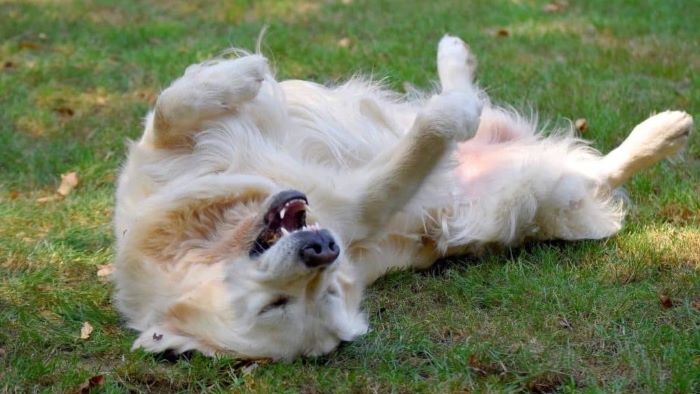
You must have seen your dog rolling into poop or other gross things, it can’t go downhill📉 from here right! but it can.
Surely it must be confusing and concerning when you find your dog covered in foul dead smell. Let’s take a look into the dog world to understand this behaviour whether it is normal or not and how we can prevent this!
Why Do Dogs Roll in Dead Animals?
Dogs are curious animals. They want to smell everything(literally). There are many dog behaviours which humans find strange but are common among dogs, just as rolling in dead animals.
While this is natural doesn’t mean it is safe too. Sometimes dead animals carry diseases which may harm our dogs, so we must not encourage🚫 this behaviour.
Many experts at the American Kennel Club believe, "This behaviour is derived from dog's wild ancestors.🐺 They roll into dead animals before hunting in order to hide their smell to hunt more successfully." Let's see other reasons as well:
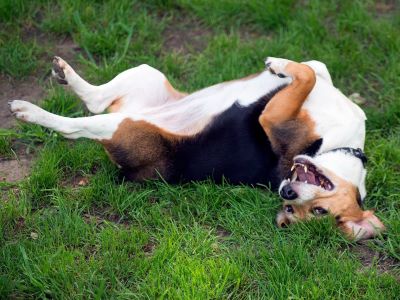
1. Marking Their Territory
Dogs have a strong sense of smell, and they can detect scents that we can’t. When they roll in a dead animal, they may be trying to bring that smell back to their pack or home as a way of marking their territory.
This is like saying, “I’ve been here, and this place belongs to me and my group.” By spreading the new smell around, the dog leaves its own mark in that area. This sends a message to other dogs that “this territory is mine!”
2. Masking Their Scent
In the wild, dogs are hunters, and they also have predators like wolves. By rolling in the scent of dead animals, they can try to hide their own smell[1].
This could help them when they’re hunting, as prey animals may not recognize the dog’s scent as easily. When hunting, dogs need to hide their own smell so prey doesn’t detect them coming.
Disguising their smell helps them sneak up on their target.🎯
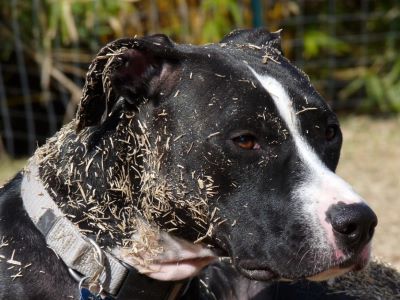
3. Communication With Other Dogs
Dogs are social animals, and they communicate with each other in various ways. Rolling in a dead animal scent might be a way of telling other dogs about their adventures or what they’ve found.
It’s like a doggy version of sharing stories with their friends. Dogs can tell a lot about each other by their smells. Rolling in strong remains lets other dogs know “I found something interesting!”✨
4. Appreciating the Smell
Dogs have a very strong and unique sense of smell compared to us. While the smell of a dead animal might be gross to us, dogs may find it interesting or even pleasant.
So, in some cases, rolling in something smelly could be a way for them to have a little sensory adventure. Dogs simply enjoy and appreciate new smells, just like we enjoy new foods. The remains smell “good” to the dog, so they want it on themselves.
How Do You Stop Dogs From Rolling in Dead Animals?
Preventing this behaviour in dogs can be a challenge as this comes naturally to them. But we can always try our best and we are here with some practical tips to make this process easier, let’s see them:
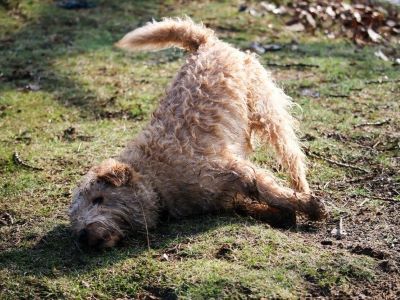
- Training: Teach them commands like “leave it” or “come” and reward them when they listen. When you see your dog hovering over something smelly, use these commands to redirect their attention.👀
- Work on Recall: Recall training is crucial. Make sure your dog comes back to you when called. If you see them heading towards a dead animal, a strong recall can help you get them away from the tempting smell quickly.⌛
- Fence in Your Yard: If you have a yard, consider putting up a secure fence. This can help keep your dog away from dead animals or other items they might want to roll in when they are outside.
- Wash Them: If your dog does manage to roll in something unpleasant, you’ll need to give them a bath. Use a dog-friendly shampoo.🧴 Be thorough, as dogs have a keen sense of smell, and they might want to roll in it again if any scent lingers. Try to semi-clean them outside the home.
- Distraction: Carry toys or treats with you when you go for walks. If your dog starts sniffing something they shouldn’t try distracting them with a toy or treat to redirect their attention.
When you’re out for a walk or in an area where you know there might be dead animals, keep a close eye on your dog. If you see them showing interest in something they shouldn’t use your training and recall commands to prevent them from doing it!
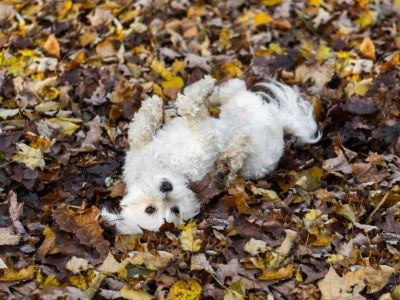
How Do You Remove Dead Smell From Your Dog?
It’s time to remove that foul smell from your dog and do not expect that your doing is going to enjoy this bath as they like this smell. Bathe them thoroughly. Use a dog-friendly shampoo🫧 and lots of water to fully scrub the stinky areas.
Focus on places like their neck, back, and sides where they likely rolled. You can also use apple cider vinegar or baking soda for this.
Use a slicker brush all over your dog’s coat after bathing to lift out dead smells trapped deep in their fur. Use pet-safe cleaning products to wash their collar, leash, bedding and any blankets to remove soaked-in smells. Let your dog dry entirely after their bath before going inside. 🏡
Be patient! It may take more than one bath to fully remove the dead smell. Some odour may stay in their coat for a day or two.
What to Do if a Dog Eats a Dead Animal?
While awful, eating dead things is natural dog behaviour. The main risk is getting sick from bacteria or parasites. If your dog has swallowed the dead animal in large pieces, there’s a risk of choking.
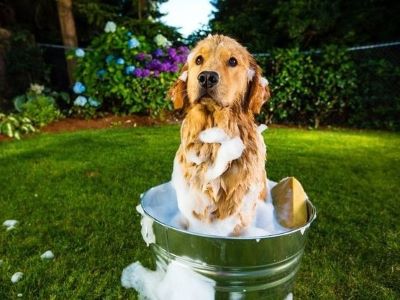
Try to identify the dead animal. Smaller animals like rodents carry more risks than larger dead animals. While it might be your instinct to make your dog vomit, it’s not advised in this situation, as it can be harmful.
Vomiting can cause the dog’s body to work harder, and if the dead animal is infected or has sharp bones, it could cause further harm. If your dog seems sick: vomiting, coughing, diarrhoea, lethargy, within the next 2-3 days,📅 contact your vet. Make sure your dog is eating and acting normally over the next few days.
Loss of appetite or energy could indicate a problem. Feed plain yoghurt for a few days to support a healthy stomach. Use a pet mouthwash to gently wash away bacteria🦠 and rinse their mouth if they eat dead remains.
FAQs
Do Dogs Recognize Dead Dogs?
Although we observe that dogs do grieve for other dogs, they may not fully comprehend the concept of death and all of its metaphysical implications. Dogs don’t necessarily know that another dog in their life has died, but they know that individual is missing.
Why Do Dogs Roll In Smelly Things?
Many believe it’s instinctual behaviour, harkening back to the days when your dog’s wild ancestors would mask their scent to help them sneak up on their prey. Wolves, for example, have been observed rolling in animal carcasses or the droppings of plant-eating animals, to cover up their own smell during the hunt.
Why Do Dogs Roll in Dead Animals?
To mask their scent. Before they go hunting, they’ll roll around on a dead animal to cover their own scent, making it easier to sneak up on their prey This is called scent camouflage and is all a part of your pup’s natural instincts. Once they’ve left their scent on something, it signals to other dogs this is their property or territory. They are claiming this animal carcass so other dogs aren’t tempted to take it
Why Do Dogs Hate Baths?
Bath Time Feels Stressful. Dogs take their emotional cues from their pet parents. If you treat the bath like a stressful experience, your dog will follow suit, points out Dogster. Shouting at your dog, handling them roughly and hurrying through the bath all teach your dog that baths are something to fear.
Summary
In conclusion “Why do dogs roll in dead animals?” The key🗝️ is making dead animals more and more uninteresting, and this is going to be difficult as their natural instincts work their force.
But we can surely try to prevent it by training them in commands and keeping an eye on them when they are outside. Remember, be as persistent as your dog is for that smell because as responsible pet parents, it is our duty to keep them safe and healthy!💖
Reference:
- Arnold, V. L. (2023, March 16). Why do dogs roll on dead animals? PetMD.



